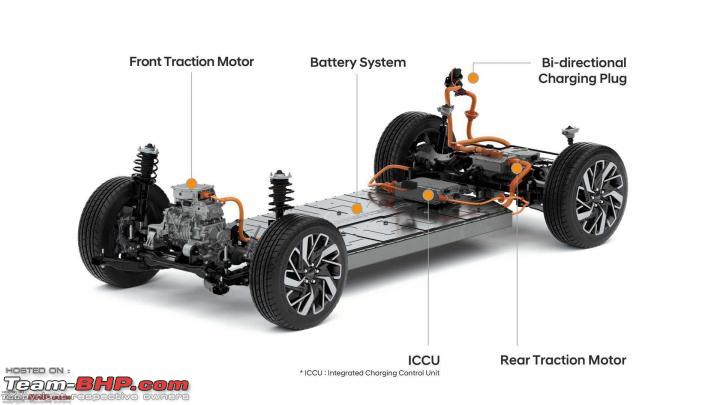News
Electric car batteries: How concerned are you about replacement costs
I don't think the batteries under mainstream EVs will have the quality (and thus, durability) of Tesla batteries.
GTO recently shared this with other enthusiasts.

Everyone's going crazy about electric cars right now, and rightly so. This is the biggest game-changing technology we've seen in the automotive space in 100 years! EVs offer superb performance, refinement, 1 rupee / km fuel costs and low maintenance. Importantly, Tata & MG are building EVs that are relatively attainable. Others are working hard, including Maruti & Hyundai.
But I remain concerned about the life of EV batteries. Let's please not keep Tesla as a benchmark because Tesla competes at the higher end of the market, and that premium pricing gives it the freedom to choose the best-of-the-best batteries. Not only does Tesla have a close relationship with Panasonic, but there are also its gigafactories. Let's also not overlook Tesla's expertise & experience in EVs; they are fanatical about battery health.
I don't think the batteries under mainstream EVs will have the quality (and thus, durability) of Tesla batteries. IMHO, a lot of long-term EV owners are going to be in for a rude shock.
- Because EVs are just taking off in India, we have absolutely no information on battery life in the long term.
- 8-year battery warranties are becoming common. What after that? Is it going to cost a bomb? Check out the E2O's battery price, despite being a much smaller unit than what we see today.
Of course, the point to note is that, as production increases, the price of batteries will go down.
- I don't think too many first-owners will be worried as most Indian owners generally replace their cars every 5 - 6 years. But people like us who hold onto cars for 8 - 10 years are going to be in for a nasty surprise, as are 2nd & 3rd owners of EVs.
- That said, if EV batteries indeed need replacement at the 7 - 8 year mark, it will greatly affect resale values. Hence, first-owners can get adversely affected too.
- I guess it's a roll of the dice. Some brands might be able to get healthy lifespans out of their batteries, while other OEMs won't. All ICE cars don't have the same long-term reliability & the obvious trend will continue with EVs.
- Unless batteries come cheap (even if used), we are going to see a lot of abandoned 10+ year-old EVs (just like 10+ year-old luxury German cars), because the battery replacement cost will greatly exceed the book value of the car.
- Opportunity: Aftermarket battery suppliers which give you a good battery for 1/3rd the price of the authorised dealer. But safety will be key here. No one wants to run around with a potentially dangerous battery under their car. On a related note, we can expect cheap Chinese batteries from unknown sources to flood the market.
- Even in the aftermarket, good batteries won't be cheap. I reckon the cost will exceed that of overhauling a petrol / diesel engine.
Here's what BHPian shortbread had to say about the matter:
Before we discuss the battery-related arguments, I would like to flag the unconscious bias towards EVs vis a vis ICE cars.
- Do ICE cars lose performance with age? YES, they lose power with time, FE decreases and they pollute more as the engine enters 6 figures.
- Do ICE cars get abandoned? YES hundreds of thousands of abandoned vehicles litter all over India of various shapes, sizes and vintage. None of them due to a lack of LiIon batteries, but that's a government policy making gap... hopefully rectified in the near future.
- Do ICE cars hit pockets with expensive repairs? YES. Keep Maruti aside and every other carmaker has been regularly blamed either for exorbitant repair bills or reliability issues from day 1. Let's also not forget the fact that EVs incur far less servicing costs and intervals during their lifespan.
- Do ICE cars carry more 'fault prone' componentry? YES. Eg. Gearboxes (more so with the advent of more advanced auto boxes like dual clutch units), timing belt, chains, engines, filters, oil leaks etc...EVs have far fewer moving parts.
- Do older ICE cars end up with higher repair bills than the cars worth? YES. Let alone zze Zermans, look at all the abandoned Escorts, Cielos, Astras, Corsas, Optras etc, etc.
The most important word we cannot ignore is 'Progression'.
- The argument assumes battery technology is stagnant. A rival manufacturer cannot catch up with Telas benchmarks of today, or Tesla not lifting the barriers further. Rest assured it is not, battery tech has come leaps and bounds over the last few decades. Imagine the power density and longevity gains batteries make each progressive year, it's massive. Battery research currently is rampant, one of the biggest areas of R&D expenditure globally. If we get 8-year warranties today, imagine what it will be in 5 years? ICE progress is comparatively stagnant.
- EV Battery prices have literally crashed in the last decade. This is despite global mass scale production is still comparatively in its nascent stages.
- Battery recycling is a fast-growing industry and the tilt is towards exchanging/monetising older battery packs.
- Localisation of battery manufacturing is just getting started in our country.
- In a decade's time elongating the life of an EV with a battery swap will be far more straightforward, efficient, easier and will not need the TLC of an ICE car of comparative vintage.
Here's what BHPian Jeroen had to say about the matter:
From what we see today EV batteries are lasting way beyond the 8-year mark already. Also, when do you want / need to replace a battery. Just because it doesn’t hold as much charge as originally, when do you change it out.
As battery technology improves, the battery life will improve. E.g. a battery that gives you a new 300 km range, might still be acceptable at a 200 km range, which is only 66%. A battery with a new 500 km range at 66% efficiency still gives you 330 km.
The 8 year mentioned is what EV manufacturers currently use as a warranty.
A WARRANTY!
That doesn’t mean it stops working after eight years! Those EVs will run for years after those 8 years.
Most current batteries are likely to last anywhere up to 10-20 years easily!
Have a look at this article which also makes some predictions on how much more the price of batteries is coming down.
We are likely to buy our first EV in the next 4-5 years. By then I doubt this is an issue at all. And it probably isn’t a real issue currently on most cars.
I think the biggest problem with new technology is we all worry way too much. And we tend to get stuck in rethinking and arguing around the initial shortfalls and problems. We should keep up with the current state of affairs and look beyond it as well. Then all old initial problems and challenges will disappear.
I can’t think of any new technology ten years after mass adoption that has any real concerns left!
Here's what BHPian ninjatalli had to say about the matter:
Let me give an analogy argument. I purchased the VW Vento less than a year after its launch, with abundant questions about its long term reliability. I remember TeamBHP reviews back then putting forth similar questions on long term reliability.
I kept the car for 8 years. Around the 6th-7th year mark, post extended warranty period, the injectors went kaput. Had to plunk 1L extra for that. More expenses for other maintenance issues that came up but you get the draft. Could have stuck to 'safer' options of Maruti (SX4) and Hyundai (Verna) which offered a decent option but nowhere close to what the Germans were offering.
We have a well-accepted view on the forum saying if you go the German route, plan for some additional maintenance expenses in the longer run. I'd say that's the mindset one needs to have wrt EVs. Hope for the best (battery lasts well and replacement costs are reduced by then) but still plan for some additional hit in the end.
Here's what BHPian cool_dube had to say about the matter:
My Nexon EV comes with a battery warranty of 8 years, which is a LONG period of time in today's uncertain world. Why lose sleep on something that far ahead in time?
It is not that the battery is just going to die the very next day after completing 8 years. Sure, it will lose some capacity leading to some loss in range, which would certainly not render the car unusable.
With the pace at which EV tech is progressing, I am sure I will have a plethora of inexpensive, hassle-free, and high-quality options to replace my Nexon's battery when the need arises (minimum of 8 years).
Check out BHPian comments for more insights and information.


















